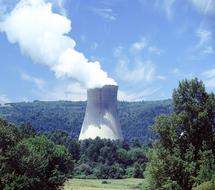Save 'trillionth tonne' warn Oxford scientists

(PhysOrg.com) -- Emitting carbon dioxide slower will not prevent dangerous climate change unless it involves phasing out carbon dioxide emissions altogether, before we reach an upper limit of one trillion tonnes of carbon, a team led by Oxford University scientists has concluded.
Two studies published in today’s Nature show that the risk of dangerous climate change is primarily determined by the accumulation of carbon dioxide emissions over time, not by short-term emission rates.
The first study, led by Dr Myles Allen from Oxford’s Department of Physics shows that total cumulative emissions of one trillion tonnes of carbon (1 Tt C, or 3,670 billion tonnes of carbon dioxide) over the entire ‘anthropocene’ period 1750-2500 causes a most likely peak warming of 2 degrees Celsius above pre-industrial temperatures. Most of the world’s governments are committed to avoiding warming in excess of 2 degrees Celsius. Of this budget, emissions to 2008 have already consumed approximately half (0.5 Tt C).
A second study, led by Dr Malte Meinshausen from the Potsdam Institute for Climate Impacts Research and co-authored by Dr Allen and Dr David Frame from the Oxford University Smith School of Enterprise and the Environment, finds that a total emission budget of about 0.9 Tt C gives a best-estimate peak warming by 2100 of 2 degrees Celsius, including the effects of other human influences on climate. This budget drops to less than 0.75 Tt C (equivalent to 1,000 billion tonnes of carbon dioxide between 2000 and 2050) if the risk of temperatures exceeding 2 degrees Celsius is limited to one-in-four.
‘Mother Nature doesn’t care about dates,’ remarks Dr Allen. ‘To avoid dangerous climate change we will have to limit the total amount of carbon we inject into the atmosphere, not just the emission rate in any given year. Climate policy needs an exit strategy: as well as reducing carbon emissions now, we need a plan for phasing out net emissions entirely.'
Dr David Frame from the Oxford University Smith School of Enterprise and the Environment comments that as well as a challenge to climate policy-makers these findings could be seen as an opportunity: ‘By treating the effective ‘CO2 capacity’ of the atmosphere as an exhaustible resource, we could provide governments and industry with simple, clear and tractable guidance for long term planning.’
Provided by Oxford University (news : web)
















